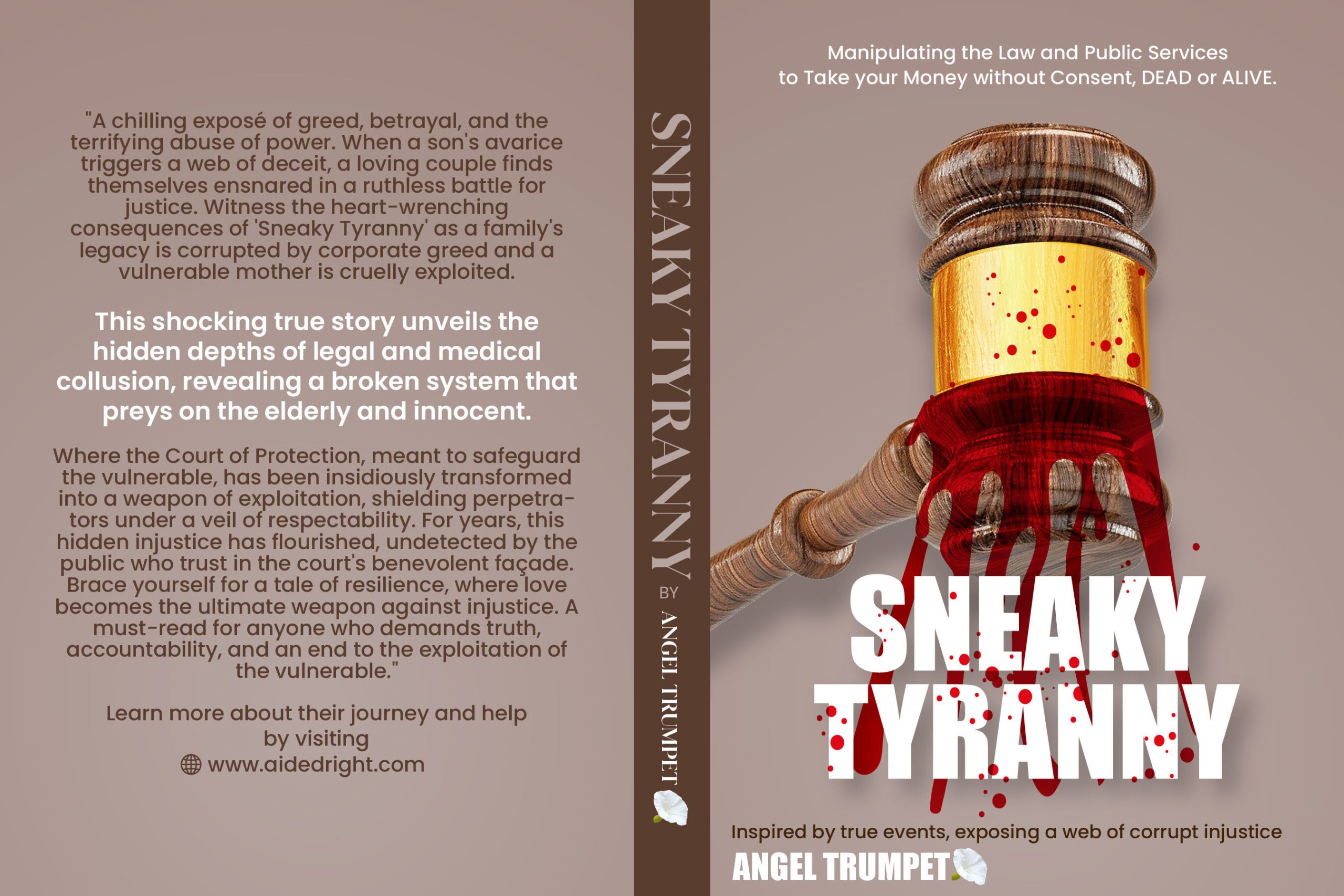Need Help?
reach@aidedright.com
reach@aidedright.com
“Court exploitation is a harsh reality for many vulnerable individuals, and it’s time to shine a light on their experiences.”
Financial abuse is a form of domestic abuse that involves controlling a victim’s access to financial resources, thereby exerting power and control over them. It can take many forms, including
Perpetrators, including court-appointed lawyers, may limit a victim’s access to bank accounts, credit cards, or cash, making it difficult for them to enjoy spending, meet their basic needs or leave the abusive relationship.
Perpetrators may coerce victims into taking on debt, often in the form of loans or credit cards, without their consent. This debt can be used as a means of control, trapping victims in a cycle of financial dependence.
Perpetrators may steal money from a victim’s bank account, withhold funds for necessities such as food or shelter, or refuse to contribute financially to household expenses.
Protecting the perpetrators from abusing the court process may falsely pursue criminal activity, aware no crime exists to discredit the court’s victim’s partner. Premeditated court victim abduction and sedation could occur, facilitating the perpetrators to loot the victim’s bank accounts and expensive jewellery.
Perpetrators may exploit a victim’s financial dependence, using it as leverage to manipulate and control them. This can include threatening to withhold financial support or kicking the victim out of their home.
Court-appointed perpetrators for property and affairs may exploit a victim’s home assets, such as valuables stored in the home safe. Taking the expensive items for evaluation with the real intention of depriving them.
A court of protection perpetrator may judge who causes a serious court data protection breach, pretends to seal court orders, ensuring all billed costs are to be assessed by the Senior Courts Cost Office to deceive a financial sense of security and ambush their court victims partner in court without legal representation to intimidate and control.
Both in memory and mental capacity, are intimidated by the court. To falsely remove their court victim’s ability to make financial decisions, and may even set up the victim’s partner to be in contempt of court. They could present fabricated court witness reports and statements.
Court visitors may assist the Perpetrators by falsely revoking the last power of attorneys to facilitate the court of protection to falsely label the court victim lacks the mental capacity to control property and financial affairs to loot.

In the world of justice, where fairness and protection are expected, a troubling reality exists: the vulnerable are frequently targeted and mistreated within the very institutions designed to keep them safe.
Our ‘Victims page’ is a space on our website dedicated to sharing the problematic experiences of those whom the courts have exploited. Through personal stories, revealing statistics, and an examination of system flaws, we strive to increase awareness, assist, and push for positive change.
Victims of financial abuse come from all walks of life and can be of any gender, age, or socioeconomic status. However, certain factors may increase an individual’s vulnerability to financial abuse, including –
Victims who are financially dependent on their abusers, such as stay-at-home parents or individuals with disabilities, may be at increased risk of financial abuse.
Perpetrators may isolate their victims from friends, family, and support networks, making it harder for them to seek help or escape the abusive situation.
Victims who are unfamiliar with financial matters or lack access to resources and support may struggle to recognise or address financial abuse.
Our ‘Victims’ page isn’t just a place to read stories—it’s a call to action. We are here to demand justice, accountability, and protection for those whom the courts have exploited. Through spreading awareness, educating others, and offering support, we aim to empower victims and expose the harsh realities of our broken legal system.
Together, we can demand change, hold perpetrators accountable, and ensure that justice prevails for all. Share, support, and join us in our mission to end financial abuse and create a future where everyone has the right to financial autonomy and security.
Court exploitation preys upon society’s most vulnerable members, often targeting individuals with wealth or financial assets. These individuals, usually unsuspecting of the dangers posed by the legal system, become entangled in a complex network of deception and manipulation. By the time they grasp the full extent of the exploitation, it’s often too late. They find themselves trapped, helpless, and at the mercy of financial predators who operate with impunity and motivated financial reward.
The concealment of court exploitation begins long before the victim ever sets foot in a courtroom. Behind closed doors, local authorities, the Office of the Public Guardian, and law enforcement agencies collaborate to manage behind-the-scenes manoeuvres that serve to victimise the vulnerable further. This conspiracy, conducted in secrecy and devoid of accountability, leaves victims isolated and abandoned, betrayed by the lack of transparency and by the very institutions meant to protect them.


The very institutions entrusted with upholding justice and protecting the vulnerable have become breeding grounds for exploitation. Courtrooms, once seen as bastions of integrity, have been tarnished by manipulation and abuse of power. Vulnerable individuals, targeted under the guise of protection, find themselves at the mercy of a broken legal profession that prioritises self-interest over the well-being of those it is meant to serve.
If you have any inquiries about accessing our founder’s book “Sneaky Tyranny” (manipulating the Law and Public Services to Take Your Money without Consent, dead or alive) or arranging a free session with us, head to our website and click on “Contact Us.” Fill out the form with your email ID and any other relevant details.
After you submit your message, our team will review it and get back to you promptly to discuss it further. We’re here to help, so don’t hesitate to reach out.

Sneaky Tyranny exposes the shocking truth behind a legal system tainted by greed, where a family’s deepest betrayals transform a quest for justice into a desperate struggle for survival.

© 2024. All Rights Reserved.

At Aided Right, we are committed to enlightening these egregious injustices and advocating for meaningful change. Our mission is to expose and challenge the abuses of power within the legal profession and support those who have been unjustly treated or abused by misused power. We aim to challenge and improve the Mental Capacity Act, which has become a tool for courts to exploit the vulnerable for ill-gained profit financially.
Lorem Ipsum is simply dummy
1234 123 1234
9am – 6pm (UK times)
reach@aidedright.com
© 2024. All Rights Reserved.
Victims are forced under financial family control. Fraudulent activity is typically applied to their victim’s accounts or financial investment portfolio. In extreme cases, the family member may use a toxic family friend to gain interest in the property and may be employed by an investment business, encouraging a conflict of interest with the family member’s wealth. This type of family manipulation is typically business-assisted and protected by the secret family court assisting statutory court inheritance plans. They are preventing their court victim from ever making a will.
The court-appointed lawyer may, for example, prevent their court victim from receiving the right to claim for attendance allowance as tax-free income, as another way of financially depriving their court victim’s quality of life and marriage.
Financial abuse is often accompanied by other forms of abuse, such as emotional, physical, or sexual abuse, further exacerbating the victim’s vulnerability and isolation. At Aided Right, we recognise the devastating impact of financial abuse and are committed to providing support, resources, and advocacy to victims.
Through education, empowerment, and collaboration, we strive to break the cycle of financial abuse and ensure that all individuals have the resources and support they need to rebuild their lives free from exploitation and control.
In the troubling realm of court exploitation, many victims initially turn to trusted medical professionals like GPs or specialists, hoping for refuge from the manipulation and exploitation they endure. They cling to the belief that validation of their mental capacity by medical experts will shield them from further harm.
But sadly, reality paints a different picture. Despite the assurances and assessments provided by medical experts, victims often find themselves disillusioned and disregarded by the very institutions meant to uphold justice. The courts, entrusted with safeguarding the vulnerable, frequently fail to acknowledge the validity of these assessments, leaving victims exposed to exploitation and manipulation.
To understand it better, consider Sarah’s case, for instance. She sought help from her GP after being financially exploited by a family member. Despite her GP’s thorough assessment confirming her mental capacity, the court dismissed her claims and appointed a guardian to oversee her affairs.
Similarly, John, a retired businessman, consulted a specialist psychiatrist after being coerced into handing over control of his assets to a distant relative. Despite the psychiatrist’s detailed report affirming John’s mental capacity, the court ignored the expert opinion, leaving John powerless and at the mercy of his exploitative relative.
These examples underscore the devastating consequences of misplaced trust in the legal system. Victims, already vulnerable and seeking refuge, find themselves further victimised by a system that fails to recognise their autonomy and agency. Their illusion of protection is shattered; they are trapped in a cycle of exploitation with little hope for justice.
We must acknowledge and fix these systemic failures, holding those responsible accountable for their actions. Only then can we begin to restore faith in the legal system and ensure that vulnerable individuals receive the protection and support they so desperately need and deserve.